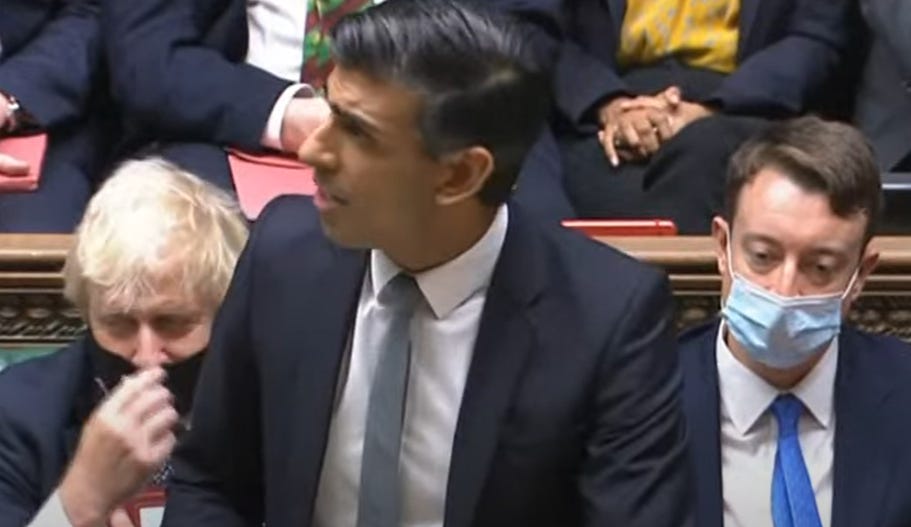Thousands hit by another council tax blunder from North Northamptonshire Council
Plus local reaction to yesterday's budget
Good morning, today’s newsletter is slightly different to normal as it includes two stories instead of one. We had planned to run a piece on the budget but late yesterday afternoon a story broke about another major council tax error from the North Northants local authority. So today we bring you coverage of both.
North Northamptonshire Council will carry out a review into a council tax error which could see people living in the Wellingborough area out of pocket just before pay day.
The authority realised yesterday afternoon that payments of council tax due to leave residents’ bank accounts on November 1 will instead go out today. The council said it was unable to recall the request for payment.
With many people typically being paid on the last working day of the month, the error could result in residents being charged by their bank or leaving them short of cash.
The leader has now had to apologise twice in a week for an error made by the authority’s finance department.
“We cannot apologise enough for this payment being taken early and any distress which may have been caused,” leader of the council Jason Smithers said last night.
“I have requested that a review takes place urgently to ensure that this does not happen again but our first priority is to ensure residents are aware of the situation and do not worry unduly.
“I would urge anyone who has a concern or is suffering from financial difficulty as a result of the early collection to make contact with us and we will help you through the process to ensure no one is left out of pocket.”
Earlier this week the Northants Telegraph reported how hundreds of people in Corby had wrongly received a court summons for non-payment of council tax.
Cllr Smithers, who has been in charge since the May elections, said the two issues were not related.
“It is very unfortunate that there have been two errors regarding Council Tax collection in the same week but they are completely unrelated.”
Leader of the opposition in North Northants, Cllr Jean Addison said the error was an indication of how the authority is being run.
“Don’t they realise the impact that this will have? If people become overdrawn they will incur charges. This is not a good sign of how the authority is running.”
The council is asking anybody who has experienced financial difficulties or bank charges because of the error to contact them through their website here: www.northnorthants.gov.uk/DDissue
Autumn Budget 2021
After months of bad headlines over cuts to Universal Credit and plans to raise National Insurance, Rishi Sunak knew that yesterday’s budget not only needed to win over voters but also his own Tory back benchers.
He knows that many of his party are supporters of a small state and low taxes but with Covid and the impact of Brexit hitting the economy he’s found himself in a difficult position.
Add to that issues which affect everyday voters like sky-high petrol prices, rising fuel bills and worker shortages in several sectors it’s not hard to see why the chancellor needed to do something major to win back support.
“Last year the state grew to be over half the size of the total economy. Taxes are rising to their highest level as a percentage of GDP since the 1950s,” he told the Commons yesterday.
“I don’t like it but I cannot apologise for it - it’s the result of the unprecedented crisis we faced and the extraordinary action we took in response. But now we have a choice.
“...My goal is to reduce taxes. By the end of this parliament I want taxes to be going down not up. I want this to be a society that rewards work.”
Some of his key announcements were:
An increase of the minimum wage for people over the age of 22 from £8.91 to £9.50
Changes to alcohol duty which will see stronger drinks have a higher duty
A £6.9b investment for the transport sector
An increase in fuel duty to be scrapped
The Universal Credit taper rate to be cut meaning some will take home more each month
50 per cent discount on business rates for certain sectors up to a maximum of £110,000
So some good news for some, but with inflation set to rise above four per cent next year and the Office for Budget Responsibility saying that taxes as a share of national output will be the highest since the 1950s, has the chancellor done enough to keep his party and the country happy?
Here’s some reaction from Northamptonshire:
Adrian Pryce, deputy lieutenant of Northamptonshire and associate professor for the Faculty of Business & Law (FBL) at University of Northampton
An interesting and realistic budget given the past 18 months, the current uncertain situation and the major risks ahead, primarily inflation and possible Brexit issues swept under the carpet by the pandemic. Perhaps more Gordon Brown (Labour) than George Osborne (Conservative)?
It was interesting to see the government’s view of the state of the economy – not so bad as originally feared early in the pandemic and recovering more quickly than expected – with a return to pre-Covid levels of activity by 2022. Many businesses have done well, with plenty of innovation.
Rishi Sunak has tried to balance the prime minister’s big spending instincts with the traditional Tory desire for low taxes and government spending, but the economy, which has been on life support for over a year, still needs support.
It was good to see help for both the low paid, with an increase in the Living Wage – but coming as an extra cost for firms - as well as support for business, especially the business rates relief for the retail, hospitality and leisure sectors, and continued support for projects outside London and the South East to help with the ‘Levelling Up’ agenda.
So a future commitment to fiscal prudence, but in the short run help and support now for those most in need, people and businesses. Not revolutionary, but a sensible and realistic budget, with thankfully no return to austerity – or at least not yet. But watch out for rising inflationary pressures and upward movement in interest rates – which might cool the economy and hit all our pockets.
Robin Burgess, CEO of Northampton Hope Centre
Northampton Hope Centre has been working with people in poverty in Northampton since 1974. The struggles the poorest now face are greater now than at any point in the last forty years. Housing costs and benefit cuts, along with stagnant wages and rising household bill, all make it harder for households of all types, whether on benefits or working in lower paid occupations, to survive.
This is compounded by the cuts made to local services that can offer respite, with a greater and greater burden falling on charities like Hope to meet the shortfall – which we simply cannot do. The reality is that all of the cuts above affect mental health, wellbeing, physical health and cause problems like addictions. These are the price society – and this means all of us – pay for starving and stigmatising the poorest.
We wanted to see full reversal of the cut to Universal Credit, increased funding to local councils for support services, and above all, proper investment in true social housing at social rent levels. Until the housing market is brought under control, and proper alternatives to the private rented sector put in place, life will get tougher for people on lower incomes. The voluntary sector should be firmly part of any local responses – with funding to support us - we are not clear if new funding for rough sleeping will ever reach us, it never has done locally to date.
Although some changes were made to reduce the impact of reduced UC, the poorest are still the hardest hit, with no solace on offer. Likewise there is very little on social housing. This was not a budget for the poorest.
Leader of the Labour Opposition on North Northamptonshire council Cllr Jean Addison
It is not a budget for working families. It all just seems to be smoke and mirrors.
Families are already struggling with the cost of living, with fuel and petrol rises and I don’t think many families who are having financial difficulties will see this budget and think it is going to make a difference to them.
Money has been announced for Levelling Up - but the problem is how does this get to the areas that need it most? A lot of it will go to expensive consultants no doubt.
Leader of the Kettering Green Alliance, Cllr Emily Fedorocwyz
The duty cut on domestic flights is unnecessary and unforgivable. Six months ago, France took to step to ban internal flights where trains were available, taking clear and rational steps towards reducing avoidable flights in the face of climate change. The approach announced today is simply going in the wrong direction to tackle climate change. What’s even worse is that it’s being sold as a way to bring people together when most members of the public can’t afford internal flights - it’s businessmen and politicians taking these flights, not families.
To be fair, there are some glimpses of light in today’s budget - investment in education, in science, grants for local governments couldn’t come at a better time. We sorely need innovation and the funding to support councils, though I will be interested to see which science projects and council departments receive this funding. Investment in bus and railway services will help us on our path to Net Zero and the public are calling out for upgrades in this area. I recently conducted some consultation work on buses and people really want to use the bus services, but they are simply unable to due to cost, reliability or frequency.
I am wary of the £21bn investment in roads. It is great on the surface, but this needs to be spent in the right way. Everyone wants our roads repaired, but I fear their priority will be building new roads and cutting up our countryside. Already the Oxford-Cambridge ARC is setting out plans to connect people through new roads and infrastructure, rather than focusing on enhancing existing networks and public transport. Our green space is such a scarce commodity in the UK, so simply carving up more of it without an exceptional mitigation strategy is a fool’s errand.
The pandemic has been described by politicians and scientists as a once in a hundred-year event. Climate change is an even bigger threat and will kill even more people in the coming decades if we fail to finance the solutions we need.
Deputy Leader of the Liberal Democrats on West Northamptonshire Council Cllr Jonathan Harris
As always the devil will be in the detail. There were a few positives. It’s good to see an increase in the living wage to £9.50 and the Universal Credit taper rate reduced. However, let’s get real. The IFS have indicated that over the next five years real household income is expected to grow at just 0.8 per cent, well below historical averages. At the same time, prices are rising and inflation is soaring (estimates range between +3.9 per cent and +5 per cent by next April), crunching the value of people’s pay packets.
The reality for most people is higher food bills, higher fuel bills, more taxation through NI so any so called ‘giveaways’ such as a reduction on alcohol duty, just won’t be felt. There was much cooing over beer and micro breweries but let’s talk about the elephant in the room. The rising cost of Brexit to Britain was recently laid bare in a new analysis by the Centre for European Reform (CRE) that showed quitting the EU had delivered an £18 billion blow to the UK’s trade in goods. Some estimates put the weekly net loss to the UK at £800 million a week - a real cost of leaving the EU. These are big numbers and you can’t just put a veil over these which is what the government continues to do.
The chancellor talked of the UK becoming a science superpower - for most people this means little or nothing. One week before COP26 green investments were barely mentioned. Where are the investments for battery production, increasing wind farms, home insulation and other green infrastructure? Instead we get an entirely ill thought through policy of reducing duty on internal flights right on the eve of COP26 and whilst billions are being spent on HS2. There is a push for road infrastructure development but no mention of rail. It seems as if we are being encouraged to continue to use cars.
This is all in the context of £37 billion wasted on a track and trace system which the spending watchdog described as an “eye watering waste of taxpayers money”.
There was nothing in there for pensioners - especially in regard to winter fuel allowance which for many is a lifeline of support for those living on basic state pensions, there’s not enough in terms of supporting pupil catch-up and nothing there for councils either having had years of austerity forced upon them. The taxpayers of West Northants will continue to pick up the tab for this lack of investment.
All in all disappointing - but not surprising.
NN Journal is run by two local journalists Sarah Ward and Natalie Bloomer. To support our independent reporting please consider upgrading your membership today.







No sign of any of the Councillors responsible resigning I guess?